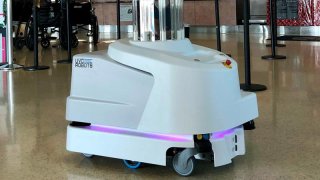
It might not be as cool as the endoskeleton from “The Terminator” or as amiable as Rosie from “The Jetsons,” but a Florida airport is getting its own robot designed to kill COVID-19 and other pathogens.
The machine began this month patrolling Key West International Airport after-hours, emitting high-intensity ultraviolet light that kills bacteria and viruses in the air and on surfaces. It's not yet clear whether the nightly disinfections will have a substantial effect against the thousands of travelers bringing new germs through the airport every day.
Richard Strickland, director of airports for Monroe County, said the $100,000 robot’s acquisition was motivated by a desire to augment the airport’s other cleanliness and passenger protection practices in the coronavirus era.
“Passengers should know that, as they travel to Key West International Airport and utilize the facilities here, that we’ve made every effort possible against the COVID to protect passengers’ safety,” Strickland said.
Get top local stories in Philly delivered to you every morning. >Sign up for NBC Philadelphia's News Headlines newsletter.
The machine, built by Denmark-based UVD Robots, features a vertical UV lamp mounted on a moving robot base. It's nearly 6 feet (about 1.8 meters) tall and weighs over 300 pounds (about 136 kilograms).
James Malley, a civil and environmental engineering professor at the University of New Hampshire, said ultraviolet light has been used for decades as a disinfectant, but it has limitations.
U.S. & World
Stories that affect your life across the U.S. and around the world.
UV lights should be used as an additional barrier to infection, not as a replacement for traditional cleaning, social distancing and wearing masks, Malley said.
According to the Centers for Disease Control and Prevention, person-to-person contact is the primary means of spreading coronavirus. It’s possible for a person to catch the disease by touching infected respiratory droplets on a surface or object and then touching their mouth, nose or eyes, but experts says it’s less common and can be prevented by regular handwashing.
Malley said multiple studies have shown that UV light is effective in reducing overall infections in hospitals, but the usefulness of the lights specifically against COVID-19 in airports and other public spaces, where large numbers of people pass through with new germs on an hourly basis, remains to be seen.
“It’s not a magic bullet,” Malley said. “How much it’s doing is hard to quantify because the studies always come later.”
UVD Robots CEO Per Juul Nielsen said the device starts around $70,000 and goes up based on accessories. Besides airports, the robot can be programmed to move autonomously around shopping malls, hotels, cruise ships and other large structures while an operator remotely oversees its progress.
UVD Robots started several years ago, long before the pandemic, as a partnership between parent company Blue Ocean Robotics and Denmark’s health care system. The objective was to help prevent patients from being infected with new bacteria and viruses after being admitted to hospitals.
When sales began in 2018, Nielsen said hospitals and other life science businesses made up about 90% of their customers. Nielsen said the business has grown nearly tenfold over the past year amid the coronavirus outbreak, with only about 60% of sales now going to hospitals.
The robot is designed to remove 99.9% of pathogens, including COVID-19, Nielsen said.
Dario Gristina, CEO of New York-based energy management company CPL Group USA, started PleXus Health Science earlier this year to build and market stand-alone UVC lamps. While a robot-mounted lamp might be tasked with covering more than a mile of corridors in a night, Gristina said his company’s lamps are ideal for restaurants and offices, where they can be manually positioned in one spot and left alone. Gristina said one of his company’s goals was creating a more affordable lamp. The PleXus device is selling for about $7,000.
As frontline heath care workers begin to take a new coronavirus vaccine, with wider vaccination expected in the coming months, Gristina said the pandemic has fundamentally changed the way people think about spreading illness and how spaces are kept safe and clean.
“I think we’re going to have a long memory about this, as humanity, as a society, throughout the world,” Gristina said. “So we see a continued need for this kind of technology.”



